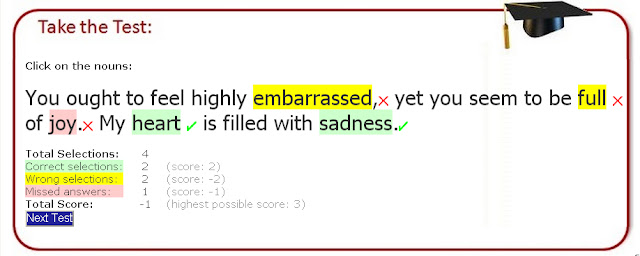1. Adverb of manner (กริยาวิเศษณ์บอกกริยาอาการ)
adverb ที่บอกว่าการกระทำนั้นได้กระทำในลักษณะอาการอย่างไร ( How ) ส่วนมากจะเป็น adverb ที่ลงท้ายคำด้วย -ly ของคำคุณศัพท์
เช่น quickly, happily, bravely, hard, fast, well
2. Adverb of place (กริยาวิเศษณ์บอกสถานที่)
adverb ที่ บอกว่าการกระทำนั้นเกิดขึ้นที่ไหน หรือ การเคลื่อนจากจุดหนึ่งไปยังอีกจุดหนัง ( Where )
เช่น here, there, everywhere, up, down, near, abroad, above
3. Adverb of time (กริยาวิเศษณ์บอกเวลา)
adverb ที่ บอกว่าการกระทำนั้นเกิดเมื่อใด ( when ) เป็นเวลานานแค่ไหน ( for how long ) และบ่อยแค่ไหน ( how often )
เช่น When = today, yesterday, later,now, last year, after, soon, before, sometime, For how long = all day, not long, for a while, since last year, temporarily, briefly, from……to, till, until ( บางตำราแยกเป็น Adverbs of Duration [กริยาวิเศษณ์บอกระยะที่ดำเนินการมา] )
How often = sometimes , frequently, never, often, always, monthly ( บางตำราแยกหัวข้อนี้ออกเป็น Adverbs of Frequency [กริยาวิเศษณ์บอกความสม่ำเสมอ] )
4. Adverb of degreeเป็นกริยาวิเศษณ์ที่ส่วนใหญ่ไปขยาย adjective หรือ adverb ด้วยกันเอง เพื่อบอกระดับหรือปริมาณความมากน้อย คำที่พบบ่อยๆ (How much) ( บางตำราแยกหัวข้อนี้ออกเป็น Adverbs of quantity [กริยาวิเศษณ์บอกปริมาณมากหรือน้อย] )
ได้แก่
เช่น very, fairly, rather, quite, too, hardly
5. Adverb of Affirmation or Negation คือ กริยาวิเศษณ์บอกการรับหรือปฏิเสธ
เช่น yes, no, not, not at all, of course, actually
*6. Conjunctive Adverbs เป็นกริยาวิเศษณ์ที่ทำหน้าที่เป็นคำเชื่อมอนุประโยค (independent clause) ในประโยค โดยมีข้อความของอนุประโยคหน้าและอนุประโยคหลังเชื่อมโยงกัน เช่นคำต่อไปนี้
เช่น next, finally, also, anyway, besides, still
*7. Interrogative Adverbs (บางตำราก็เขียนไว้ว่า Adverb of Interrogative) กริยาวิเศษณ์นำในประโยคคำถาม ได้แก่คำดังต่อไปนี้
เช่น why, where, how, when, which, who
*8. Relative Adverbs เป็นคำกริยาวิเศษณ์นำหน้า relative clause ได้แก่คำ when, where, why แทนคำ preposition + which
* หมายเหตุ บางตำราอาจจะไม่มี หรือรวมไว้ในหมวดเดียวกัน
หลักการสร้าง Adverb / แหล่งกำเนิด Adverb (หลักการเปลี่ยน adjective -> adverb)
1. Adverb ส่วนมากเกิดจากคำการเติม –ly ท้าย adjective
careful -> carefully
quick -> quickly
โดยหลักการเติม –ly มีดังนี้
a) คำที่ลงท้ายด้วย –e ให้เติม –ly ได้เลย เช่น
extreme -> extremely
ยกเว้น คำเหล่านี้ที่เปลี่ยนทั้งรูปได้แก่ true -> truly, due -> duly, whole -> wholly
b) คำที่ลงท้ายด้วย –le (-able, -ible) ให้เติม –ly เช่น
comfortable -> comfortablely
c) คำที่ลงท้ายด้วย –y เปลี่ยน –y เป็น –i และเติม –ly เช่น
happy -> happily
d) คำที่ลงท้ายด้วย (สระ+l) ให้เติม –ly เช่น
beautiful -> beautilfully
e) นอกจากกฎเกณฑ์ที่ลงท้ายตามข้อ 1-2 แล้ว เมื่อต้องการให้เป็นกริยาวิเศษณ์ (Adverb) ให้เติม ly ปัจจัยได้เลย ไม่ต้องลังเลใจให้เสียเวลา
2. Adverb บางคำขึ้นต้นด้วย a-
เช่น a+go = ago, a+broad = abroad, a+new = anew, a+part = apart, a+side = aside
3. Adverb บางชนิดเติม –wise หรือ –ward
เช่น forwards, backwards
4. มีรูปของตนเองมาโดยกำเนิด จะต่อเติมหรือตัดออกแม้เพียงส่วนใดส่วนหนึ่ง ไม่ได้ ได้แก่คำว่า here,there,hard,always,well,lften,too,ver,early, seldom,etc.
*** 5.Adverb บางคำเป็นรูปเดียวกับ Adjective
มี Adverb อยู่บางตัวซึ่งมีรูปเช่นเดียวกันกับ Adjective
คำต่อไปนี้เป็นได้ทั้ง Adjective และ Adverb
สุดท้ายแต่วิธีใช้ หรือตำแหน่งวางไว้ในประโยคของมันได้แก่
table update coming soon…)
คำทั้งหมดที่กล่าวมานี้ ถ้านำไปใช้โดยวางไว้หน้านามหรือหลัง Ber to be, taste, feel, smell, etc. ทำหน้าที่ เป็น Adjective แต่ถ้านำไปใช้โดยวางไว้หลังกริยาทั่ว ๆ ไป นอกจาก
Verb to do ฯลฯ ตามที่กล่าวมาแล้ว ทำหน้าที่เป็น Adverb ตัวอย่าง
วิธีการใช้ adverb
1. Adverb of manner
+ ถ้าประโยคไม่มีกรรมให้วางหลังกริยา เช่น They walk slowly.
+ ถ้าประโยคนั้นมีกรรม ให้วางหลังกรรม เช่น I can speak Japanese well.
+ Adverb of Manner ที่ลงท้ายด้วย -ly หรือเป็นคำที่แสดงความเห็นของผู้พูดเกี่ยวกับการกระทำนั้น ส่วนใหญ่นิยมวางไว้ในประโยค เช่น I have carefully considered all of the possibilities.
+ Adverbs of Manner อาจจะวางไว้หน้าประโยคได้เมื่อต้องการเน้น Adverb นั้น เช่น
Patiently, we waited for the show to begin.
+ ประโยคอุทานที่ขึ้นต้นด้วย How ให้วาง Adverbs of Manner ไว้หลัง How เช่น
How quickly the time passes!
+ ในประโยค passive voice ถ้ามี Adverb of Manner มาขยาย ให้วางไว้หน้ากริยาช่อง 3 เสมอ
เช่น The report was well written.
+ แต่ในกรณีที่ต้องการเน้น สามารถนำมาไว้หน้าประโยคได้ เช่น As quickly as we could, we finished the work.
2. Adverb of place
+ ตำแหน่งของ Adverb of Place ปกติจะวางท้ายประโยคหลังกริยาหลัก ( main verb ) หรือหลังกรรม ( object ) และไม่มีคำอื่นต่อท้าย เช่น
The students are walking home.
3. Adverb of time
+ Adverb ที่บอกว่าเกิดเมื่อใด ( When ) ส่วนมากจะนิยมวางท้ายประโยค เช่น
I ‘m going to tidy my room tomorrow.
+ Adverb of time ส่วนมากจะวางไว้ในกลางประโยคไม่ได้ ยกเว้น now, once, และ then เช่น It is now time to leave.
+ Adverb ที่บอกว่าบ่อยแค่ไหน ( how often ) เป็นการแสดงความถี่ของการกระทำ ส่วนมากวางหน้ากริยาหลัก ( main verb ) แต่หลังกริยาช่วย ( auxiliary verbs ) เช่น be, have, may, must
I often eat vegetarian food.
+ Adverb ที่บอกว่าบ่อยแค่ไหนซึ่งระบุจำนวนเวลาของการกระทำที่แน่นอน ส่วนมากจะวางท้ายประโยค เช่น This magazine is published monthly.
+ Adverb ที่สามารถวางท้ายประโยค หรือวางหน้ากริยาหลัก เช่น frequently,generally, normally, occasionally,often, regularly, sometimes, usually เช่น She regularly visits France.
4. Adverb of degree
+ ตำแหน่งของ Adverbs of Degree ส่วนใหญ่วางหน้าคำที่มันขยาย มักจะขยาย adjective หรือ adverb ด้วยกันเอง และวางหน้า main verb หรือระหว่างกริยาช่วย ( auxiliary verb )กับ main verb เช่น The water was extremely cold.
หลักการเรียงลำดับ adverb หลายชนิดที่ขยายกริยา
1.สถานที่ (place) 2.กริยาอาการ (manner) 3.ความถี่ (frequency) 4.เวลา (Time)
* โดยมากใช้กับกริยาที่เกี่ยวกับการเคลื่อนไหวจากสถานที่หนึ่งไปอีกที่หนึ่ง เช่น go, leave, walk, fly, come
(table update coming soon...)
* ้าเป็นกริยาที่ไม่เกี่ยวกับการเคลื่อนไหวจากสถานที่หนึ่งไปอีกที่หนึ่งให้เรียงกริยาอาการมาก่อนสถานที่
- She sang beautifully in the hall last night.


















